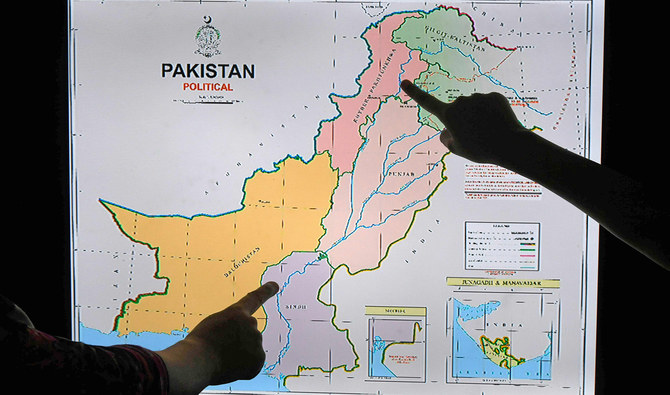ISLAMABAD: The government of Pakistan has exercised its executive authority by formally laying claim to the disputed Himalayan territory of Jammu and Kashmir in a new political map, experts said on Wednesday, adding that the move was in line with the country’s decades-old position on Kashmir since it had always maintained that the region was illegally occupied by India.
Prime Minister Imran Khan unveiled Pakistan’s new map on Tuesday, showing the entire area of Jammu and Kashmir and Gilgit-Baltistan as its territory. The decision was made in response to a similar step taken by India which released its own political map in October last year depicting Azad Kashmir and Gilgit-Baltistan, both territories governed by Pakistan, as being part of India.
The Muslim majority Himalayan valley of Kashmir remains disputed between the two South Asian neighbors since 1947. Both claim it in full but rule only parts of it. Both countries have also fought at least two full-scale wars over the territory, making the world community describe the region as a potential nuclear flashpoint.
Last year, India revoked the special status of the disputed Himalayan region’s autonomy.
“By issuing this map, Pakistan has exercised its executive authority to document its position regarding its territorial dispute with India,” Ahmer Bilal Soofi, a top Pakistani expert of international law, told Arab News.
He said that Pakistan’s action was well within the framework of international law and in keeping with the relevant United Nations resolutions promising plebiscite in the region.
“Pakistan has also reiterated its stance [through the map] that India’s illegal annexation of occupied Kashmir through last year’s presidential decree is not recognized by it,” he said, adding that territorial claims over disputed regions could be exercised through legislation, executive action and judicial pronouncements.
“Pakistan’s decision to use the executive authority in this case may also be followed by its legislative action,” he said.
Soofi said the new map would help Pakistan contest its case over Kashmir at international forums, including the UN.
“Maps are not without sanctity and significance in international law and global litigation over territorial disputes,” he said.
Pakistan’s foreign office said the new map was “essential for firmly rejecting the political map issued by India” last year, adding that New Delhi had made “false territorial claims on Azad Jammu and Kashmir and Gilgit-Baltistan.”
“The political map emphatically reasserts Pakistan’s stated position [on Kashmir],” Aisha Farooqui, the foreign office spokesperson, told Arab News.
“Pakistan’s consistent stance on Jammu and Kashmir, anchored in the United Nations Security Council resolutions stipulating that the accession of the state will be through a UN-supervised plebiscite, is further reinforced as the map reaffirms this position,” she said.
The country’s largest opposition party in parliament, the Pakistan Muslim League-Nawaz (PML-N), also endorsed the new map while urging the government to utilize all international avenues to get the dispute resolved peacefully.
“The government should clarify if it will be using the same map at international forums like the UN, or is it just for domestic consumption,” Muhammad Zubair, former governor of Sindh province and a senior PML-N leader, told Arab News.
He said that Pakistan should circulate the new map among all the embassies and international forums to tell the world about its position on the disputed territory. “The new map will be useless if it is only for optics,” Zubair said. “Let’s see how the government proceeds ahead with it.”
Dr. Zafar Nawaz Jaspal, an Islamabad-based academic and expert in international relations, termed Pakistan’s decision to unveil the new map a “wise move.”
“This is a complete map of Pakistan showing our rightful claim over the disputed Kashmir region,” he said, “though it only seems to be for domestic consumption at the moment.”
Pakistan’s new 'political map' projects decades-old position on Kashmir, experts say
https://arab.news/b7rv8
Pakistan’s new 'political map' projects decades-old position on Kashmir, experts say
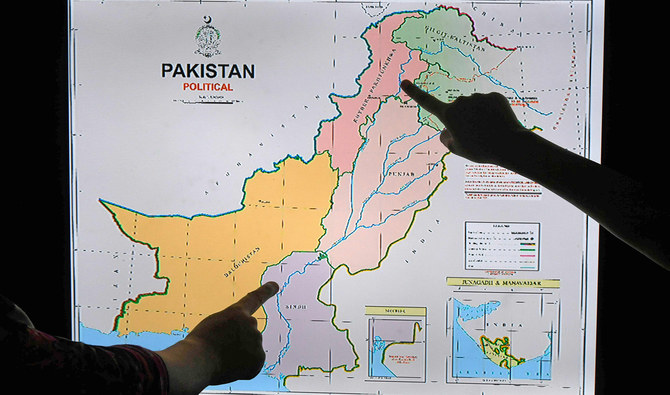
- Maps are not without significance in international law and global litigation over territorial disputes, top legal expert says
- Opposition urges government to circulate map among all embassies and international forums to convey official position on disputed territory
Five Japanese workers narrowly escape suicide bombing in Karachi
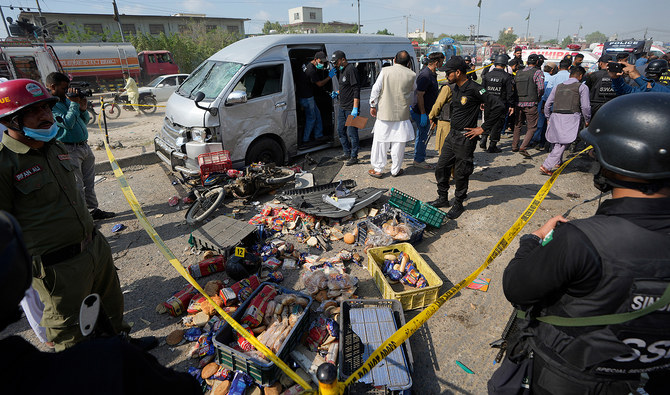
- Van attacked while heading to industrial area where five Japanese nationals worked at Pakistan Suzuki Motors
- Insurgents have recently targeted Chinese working on projects relating to China-Pakistan Economic Corridor
KARACHI: Five Japanese workers narrowly escaped on Friday after a suicide bomber detonated his explosive-laden vest near the van carrying them to their workplace, police said.
The Hiace van was on its way to an industrial area where the five Japanese nationals worked at Pakistan Suzuki Motors, according to local police chief Arshad Awan.
Police escorting the vehicle returned fire after coming under attack, killing an accomplice of the suicide bomber whose remains were found from the scene of the attack, he added. Three bystanders were wounded.
“All the Japanese who were the target of the attack are safe,” Awan told media.
Television footage on local news channels widely showed a damaged van, as police officers arrived at the scene of the attack. Awan said the three passersby who were wounded in the attack were in stable condition at a hospital.
Police were escorting the van after receiving reports about possible attacks on foreigners who are working in Pakistan on various Chinese-funded and other projects, said Tariq Mastoi, a senior police officer. He said a timely and quick response from the guards and police foiled the attack and both attackers were killed.
Prime Minister Shehbaz Sharif condemned the incident, according to a statement posted on X.
“Timely action by the police saved us from any major loss of life,” he said. “We will not rest until terrorism has been completely eradicated. We will thwart every nefarious act of disturbing the law and order situation.”
Murad Ali Shah, the chief minister of Sindh, of which Karachi is the provincial capital, directed the inspector general to submit a report after investigating the attack, including details on who the attackers were, where they came from, any information on their facilitators and details of explosives used in the blast.
He directed that immediate arrangements be made for the security of all foreigners in the province.
“Anti-national elements want to disrupt law and order, which will not be allowed at any cost,” the CM said, praising what he called timely action of the police in thwarting the attack.
No one immediately claimed responsibility, but suspicion is likely to fall on a small separatist group or the Pakistani Taliban who have stepped up attacks on security forces.
In recent weeks, insurgents have also targeted Chinese who are working in Pakistan on projects relating to the China-Pakistan Economic Corridor, which includes a multitude of megaprojects such as road construction, power plants and agriculture.
In March, five Chinese nationals and their Pakistani driver were killed when a suicide bomber in northwest Pakistan rammed his explosive-laden car into a vehicle when they were heading to the Dasu Dam, the biggest hydropower project in Pakistan, where they worked.
However, Japanese working in Pakistan have not been the target of any such attacks.
With inputs from AP
Saudi deputy defense minister discusses security cooperation proposals with Pakistan army chief
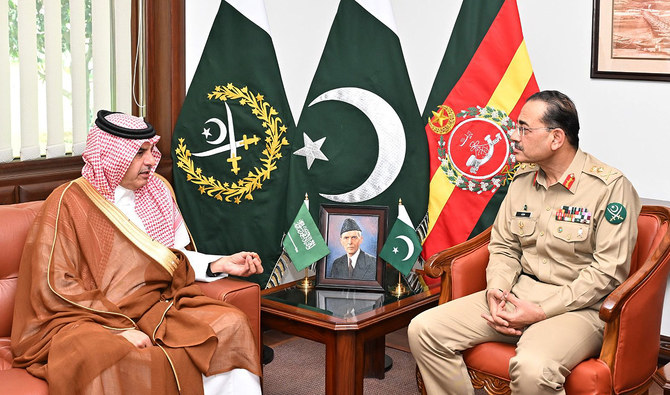
- Al-Otaibi arrived in Pakistan earlier this week to finalize defense-related bilateral projects
- Saudi official participates in the Fifth Meeting of Pakistan-KSA Defense Collaboration
ISLAMABAD: Saudi Assistant Defense Minister Talal Bin Abdullah Bin Turki Al-Otaibi called on Pakistani Chief of Army Staff Gen Syed Asim Munir on Friday and discussed defense collaboration projects, the Pakistani military said on Friday.
Al-Otaibi arrived in Pakistan earlier this week to finalize defense-related bilateral projects, according to the Pakistani defense ministry. His visit follows on the heels of a two-day visit to Islamabad by Saudi Foreign Minister Faisal bin Farhan Al Saud, aimed at enhancing bilateral economic cooperation and pushing forward previously agreed investment deals. Pakistan has said it pitched investment projects worth$30 billion to Riyadh during Prince Faisal’s visit.
“During the meeting, matters of mutual interest and measures to further enhance bilateral defense collaboration including defense production and military training were discussed,” the Pakistan army statement said.
“COAS affirmed Pakistan Army’s continuing support toward capacity building of Royal Saudi Land Forces.
“Both sides reiterated their resolve to solidify the efforts in defense collaboration with focused approach to target specific capabilities in land, air and sea domains. In this context, concrete proposals were deliberated by the forum to meet tangible objectives within specific timelines.”
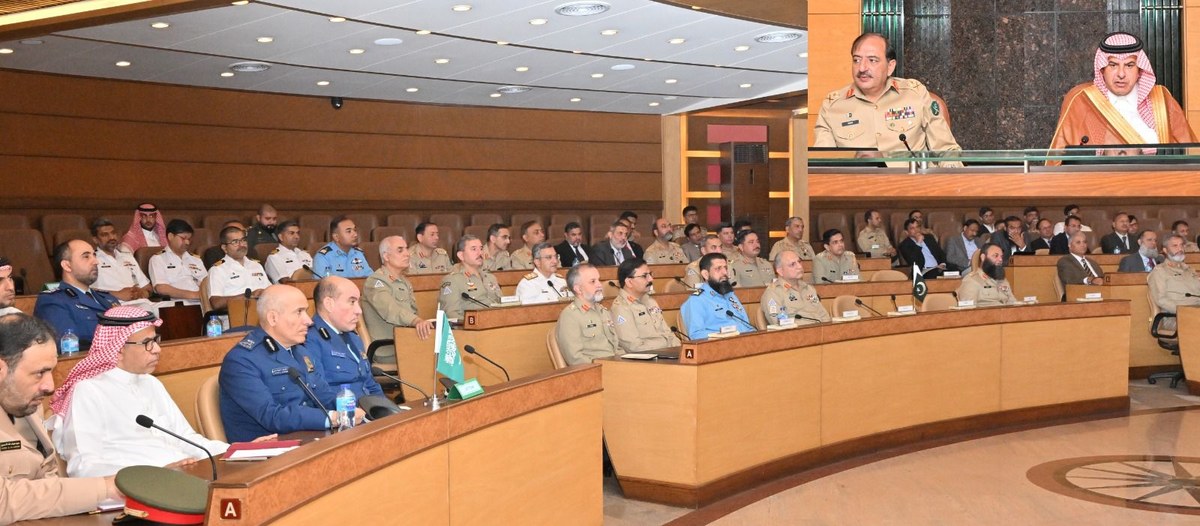
Al-Otaibi also participated in the Fifth Meeting of Pakistan-KSA Defense Collaboration at the Pakistan army’s headquarters in Rawalpindi.
The forum discussed challenges to global and regional security and noted that rapid advancements in modern technologies “necessitated defense industrial cooperation in critical capabilities between the two brotherly countries.”
“The visiting dignitary acknowledged Pakistan Army’s achievements and sacrifices in war against terrorism and Army’s valuable contributions toward regional peace and stability,” the army’s statement said.
Pakistan maintains close military ties with Saudi Arabia, providing extensive support, arms, and training to the Saudi armed forces.
Since the 1970s, Pakistani soldiers have been stationed in Saudi Arabia to protect the Kingdom and Pakistan has also been providing training to Saudi soldiers and pilots. The two nations also regularly carry out multidimensional joint ventures and defense exercises.
Five Japanese workers narrowly escape suicide bombing that targeted their vehicle in Pakistan
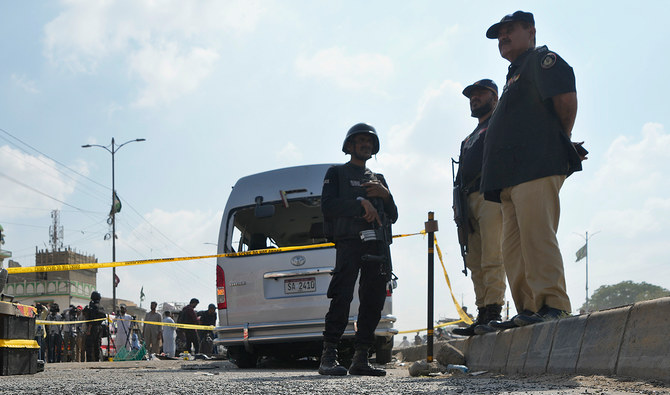
- Van had been heading to an industrial area where the five Japanese nationals worked at Pakistan Suzuki Motors
- Insurgents have also targeted Chinese working on Pakistan on projects relating to the China-Pakistan Economic Corridor
KARACHI: A suicide bomber detonated his explosive-laden vest near a van carrying Japanese autoworkers, who narrowly escaped the attack Friday that wounded three bystanders in Pakistan’s port city of Karachi, police said.
The van had been heading to an industrial area where the five Japanese nationals worked at Pakistan Suzuki Motors, local police chief Arshad Awan said. He said police escorting the Japanese returned fire after coming under attack, killing an accomplice of the suicide bomber whose remains were found from the scene of the attack.
“All the Japanese who were the target of the attack are safe,” he said.
Images on local news channels showed a damaged van, as police officers arrived at the scene of the attack. Awan said the three passersby who were wounded in the attack were in stable condition at a hospital.
Police were escorting the van after receiving reports about possible attacks on foreigners who are working in Pakistan on various Chinese-funded and other projects, said Tariq Mastoi, a senior police officer. He said a timely and quick response from the guards and police foiled the attack and both attackers were killed.
No one immediately claimed responsibility, but suspicion is likely to fall on a small separatist group or Pakistani Taliban who have stepped up attacks on security forces in recent years. Insurgents have also targeted Chinese who are working on Pakistan on projects relating to the China-Pakistan Economic Corridor, which includes a multitude of megaprojects such as road construction, power plants and agriculture.
In March, five Chinese and their Pakistani driver were killed when a suicide bomber in northwest Pakistan rammed his explosive-laden car into a vehicle when they were heading to the Dasu Dam, the biggest hydropower project in Pakistan, where they worked.
However, Japanese working in Pakistan have not been target of any such attacks.
Karachi is the largest city of Pakistan and the capital of southern Sindh province.
Pakistan police kill bomber, militant to thwart attack on Japanese nationals
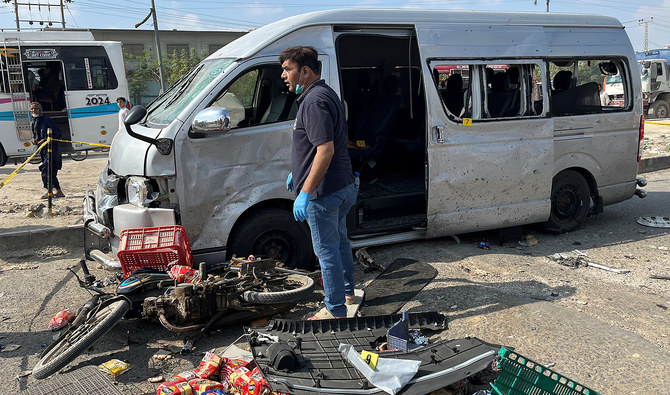
- Japanese survivors moved to a safe place in police custody, police says
- No immediate claim of responsibility for the attack from any militant group
KARACHI: Police in Pakistan’s southern city of Karachi shot down a suicide bomber and a militant on Friday as they attacked a vehicle carrying five Japanese nationals, all of whom survived, a police spokesperson said.
Islamist militants seeking to overthrow the government and set up their own strict brand of Islamic rule have launched some of Pakistan’s bloodiest attacks over the last few years, sometimes targeting foreigners, such as Chinese.
The Japanese survivors have been moved to a safe place in police custody, the police spokesperson, Abrar Hussain Baloch, said.
There was no immediate claim of responsibility for the attack from any militant group.
Pakistan seeks to engage with Global Gateway Strategy through European Investment Bank
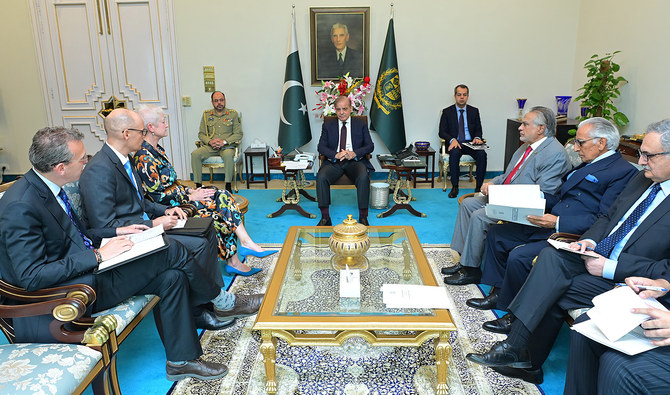
- EU to invest in infrastructure projects worldwide under Global Gateway Initiative
- Over the period 2021–2027, the European Union seeks to invest €300 billion
ISLAMABAD: Prime Minister Shehbaz Sharif on Thursday met Ambassador of the European Union, Riina Kionka, and sought the EU’s support to help Pakistan carry out important reforms in various sectors and engage with the Global Gateway Strategy through the European Investment Bank.
The EU is Pakistan’s second most important trading partner, accounting for over 14 percent of Pakistan’s total trade and absorbing 28 percent of Pakistan’s total exports. Pakistani exports to the EU are dominated by textiles and clothing.
“The Prime Minister appreciated the continuous support of the European Union to Pakistan regarding the GSP Plus scheme,” a statement from the PM’s office said about his meeting with Kionka.
“The Prime Minister said that the European Union can play an important role in providing consultation and expertise for important reforms in various sectors in Pakistan.”
Pakistan’s GSP+ status is a special trade arrangement offered by the EU to developing economies in return for their commitment to implement 27 international conventions on human rights, environmental protection and governance.
The current GSP framework came to an end in December 2023 but Members of EU Parliament (MEPs) voted in October to extend the current rules on the scheme for another four years for developing countries, including Pakistan.
During his meeting Kionka, Sharif expressed satisfaction over existing institutional mechanisms “meeting regularly to exchange views on further strengthening cooperation” and indicated Pakistan’s interest in engaging constructively with the EU’s Global Gateway Strategy through the European Investment Bank.
The Global Gateway Initiative is a worldwide strategy by the European Union to invest in infrastructure projects worldwide. The project was initiated by the EU Commission under the leadership of Ursula von der Leyen. Over the period 2021–2027, the EU will invest €300 billion.
The EU Ambassador briefed the PM on various cooperation initiatives, including an ongoing dialogue on migration and mobility issues between the two sides, as well as facilitating European businesses operating in Pakistan. Progress on the resumption of flights from Pakistan to EU countries was also discussed.


